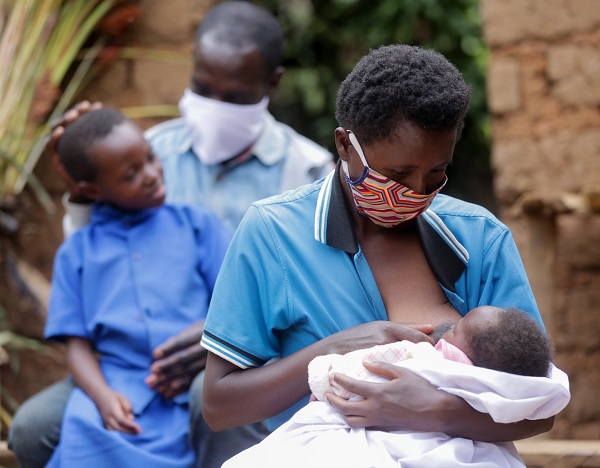
Mothers who test positive for COVID-19 can continue to breastfeed babies
NURSING mothers who test positive for COVID-19 can continue to breastfeed their babies, the Head of Reproductive and Child Health, Family Health Division of the Ghana Health Service, Dr Isabella Sagoe-Moses, has advised.
However, she advised such mothers to wear face masks when breastfeeding the babies as well as wash their hands often with soap under running water whenever they were around their babies in order not to infect them with the virus.
Advertisement
Dr Sagoe-Moses disclosed this in an interview and said studies were ongoing but so far there has not been any evidence to suggest that COVID-19 could be transmitted through breast milk. Nursing mothers who test positive for the virus could breastfeed their babies taking the necessary precaution, she noted.
Passing on COVID-19 to children
She, however, warned that it was possible for a COVID-19 positive nursing mother to pass the virus on to the baby through the usual way such as coughing on them and that is why they advise that such positive case mothers wear the mask all the time that they would be around their babies so that they do not pass it on to them.
She pointed out that the benefits of nursing mothers who test positive for COVID-19 breastfeeding their babies far outweighed the negative impact on those not breastfeeding them, adding that if they didn’t breastfeed, the babies might end up with pneumonia, diarrhoea and become malnourished and these were serious killers than the COVID-19 that they feared.

Regularly wash hands with soap under running water
"Even in COVID-19 era, breastfeeding is still the best form of nutrition you can give babies. Breastfeeding protects babies even at this time of COVID so, you should not shy away from breastfeeding," she admonished.
Benefits of breastfeeding
Dr Sagoe-Moses, who granted the interview as part of the 2020 World Breastfeeding Week which was observed from August 1 to 7, mentioned the benefits of breastfeeding on babies to include the fact that it reduced childhood morbidity and mortality.
Breastfeeding, she added, offers a complete nutrition to the baby up to six months of age and even after.
"Breastfeeding offers protection from diseases especially infections such as diarrhoea and pneumonia. Babies who are breastfed exclusively are at a lower risk of getting diseases such as diabetes, stroke and heart disease later in life. Breastfeeding also improves their intelligence," she added.
For nursing mothers who practice breastfeeding, it protects them from certain types of ovarian and breast cancers; economically, it saves them from spending money to buy baby formulas.
She said nursing mothers who breastfeed their babies immediately after delivery were protected from excessive bleeding otherwise known as postpartum haemorrhage.
Exclusive breastfeeding in Ghana
Despite these benefits, Dr Sagoe-Moses expressed concern that exclusive breastfeeding done in the country was not encouraging.
Giving figures to buttress her point, she said, in 1993 when Ghana's Breastfeeding Programme started in earnest, about two per cent of women practised exclusive breastfeeding. This figure increased to 63 per cent in 2008, however, after that, the programme started to face challenges and so the rate started to drop.
She said a recent survey conducted in 2019 revealed that 42.9 per cent of women practise exclusive breastfeeding.

Breast milk unlike baby formulas, is natural
"We noticed the drop in 2014 and we think we relaxed a bit in our campaigns and activities. That is why we have been trying to hype it a bit because it is not the best.".
She mentioned some of the programmes that have been introduced in the past to create awareness of exclusive breastfeeding to be the baby-friendly hospital initiative which promotes breastfeeding in health facilities; the passing of Ghana's Breastfeeding Law in 2000 which among others prohibits the advertisement of breast milk substitutes; educating the public, pregnant women, and nursing mothers about breastfeeding and working in the communities to form mother-to-mother support groups.
World Breastfeeding Week
This year's World Breastfeeding Week was on the theme: “Supporting breastfeeding for a healthier planet,” and according to Dr Sagoe-Moses, the theme is relevant, considering the fact that breastfeeding, unlike baby formulas, is natural.
“With breastfeeding, there is nothing like going to manufacture anything that will require electricity or a power source. Comparing this with infant formulas, there will not be any waste or any carbon emission from factories.
If you are to feed a baby solely on baby formulas for the first six months, you will need about 44 tins of the 500 grammes formula for the period. What happens to all these empty containers? If you throw them away, they can breed mosquitoes.
If they are not cans but sachets and you burn the empty sachets, carbon dioxide and fumes would be the underlying products,” she stated.



